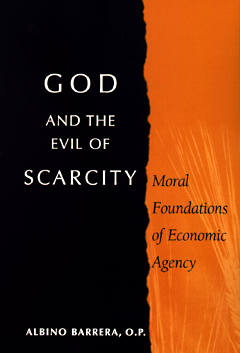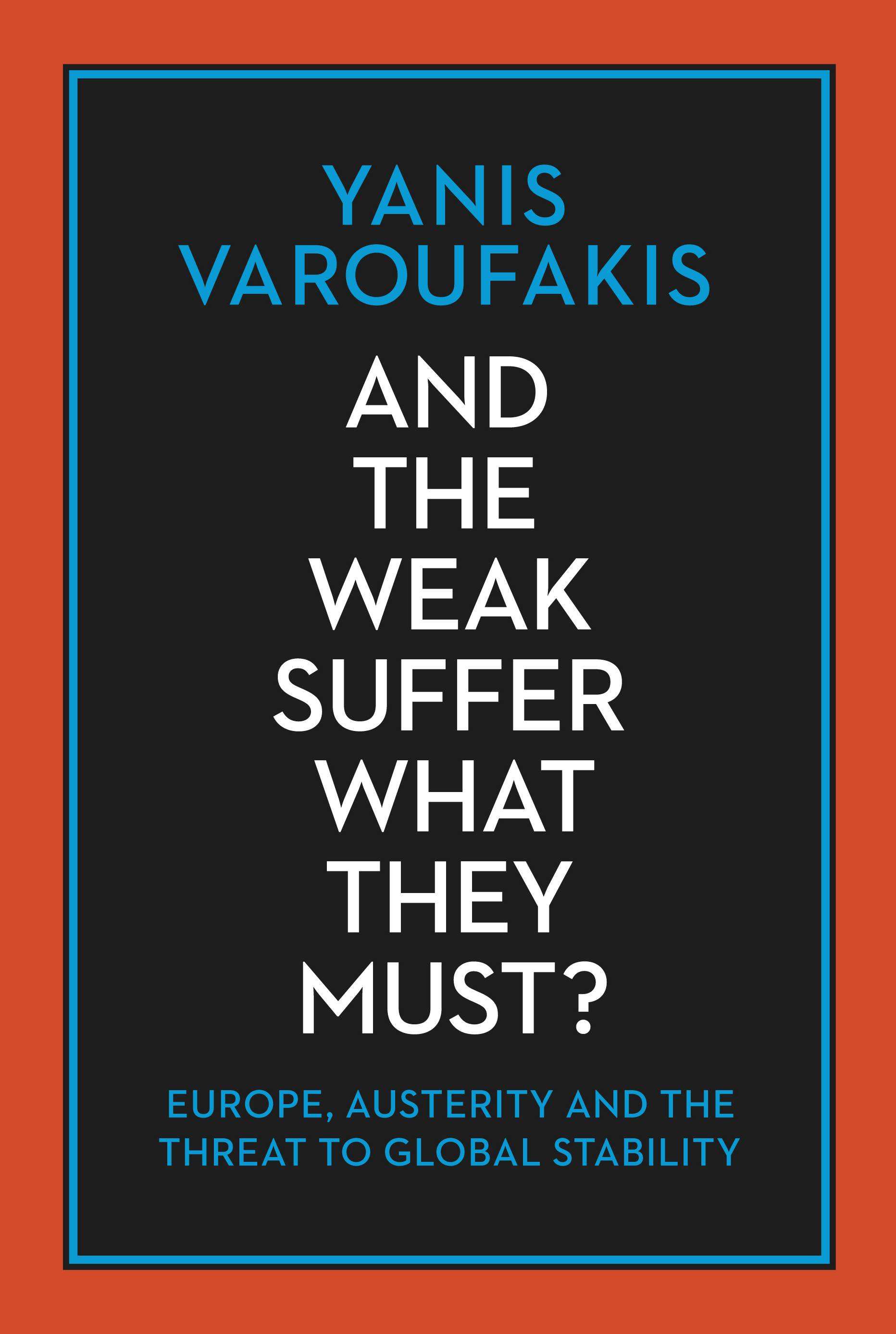
God and the Evil of Scarcity: Moral Foundations of Economic Scarcity was written in 2005, its central question is timeless. Why would an omnipotent and benevolent God permit evil? Theologians and philosophers have long struggled to explain why God would permit the suffering of innocents or natural disasters. Most conclude that God permits evil so some greater good may come forth. Ultimately, however, it is the belief that such a God exists and that He knows what is best for us which settles the argument. “Where were you when I laid the earth’s foundation?” is the beginning of God’s answer to Job (38:4).
Stronger faith and trust in God’s goodness is a pious response to the problem of evil, one that is perhaps most applicable to overwhelming evils such as those that afflicted Job. But what about those “lesser” evils, where the good God seeks involves human action of the mundane economic sort? Could it be that we are too fatalistic in the face of evil, cursing the stars when the fault is in ourselves? On the other hand, those who think they can “solve” the problem of evil may come to see themselves as gods, the self-creating masters of their own existence rather than humble servants of God.
Albino Barrera is a theologian as well as an economist. He grapples with the problem of material scarcity as a “participative theodicy” as opposed to a Malthusian one. Malthus (wrongly) predicted that population growth would outstrip the supply of the earth’s resources, leading to widespread penury and death. Barrera sees scarcity as an opportunity for human beings to partake in God’s goodness by learning through economics how to allocate scarce resources with alternative uses and sharing the resulting wealth for the common good of all, especially the less fortunate.
Actually, for Barrera, fortune has little to do with it. Material poverty is a moral evil that God wants us to eradicate through the redistribution and transfers of wealth to the poor. God commands that we care for the poor. Since we now have the means to lift people out of poverty, any shortcomings must be someone’s fault. (Presumably, the greedy rich are to blame, rather than certain policies that may keep their poor destitute.) Barrera’s economics is moralistic, in contrast with the technical studies of mainstream economics today. It is therefore part of an older tradition than modern social sciences which refuse to make “value judgments” about how human beings should live.
God gave us the material world to thrive and flourish together. Contra Malthus, Paul Ehrlich and other population control advocates, human beings are more than mouths to feed; they also have minds that can think and hands that can build, as well as hearts that feel pity for the poor. God does not simply give us what we need without our own effort and striving; faith and works complement each other. Barrera makes a strong case of the Catholic work ethic and the spirit of capitalism.
The bulk of this book, however, deals with metaphysics, not economics. The appendices contain extensive discussions of the three types of causation (formal, efficient and final) to explain how God can exercise providence, govern and still leave human beings free to act in accordance with His will. Human activity takes place within a twofold order (the whole and its parts) of the universe. These are philosophically dense but necessary treatments if one desires to bring the worlds of theology and economics together.
Yet between theology and economics, there is a yawning gap. Politics, the question of who should rule, determines the types of communities we have, how we promote the common good and much more. Law and history shape how we divide our public responsibilities. Who, for instance, will protect property rights and enforce contracts that make the creation of wealth possible? Who will ensure that wealth is not only produced but also adequately distributed? In addition, who will decide when goods such as national defense or social cohesion, to say nothing of religious observances, take precedence over material prosperity?
Barrera’s treatment of politics, law and history focuses on the Bible, especially the Old Testament. The covenantal politics of Israel offers many insights into its persistent disobedience and ingratitude towards God as well as His unbounded mercy and love for His chosen people. The political drama of the New Testament is less evident but vexing issues of Church and State are still with us. Jesus repeatedly denies to rule as an earthly king, despite the subsequent attempts of Christians to rule in His name. There have been many different forms of Christian rule, i.e. monarchic, aristocratic and democratic, through the ages. It is hard to believe that they shared the same metaphysical principles of economics, irrespective of their political arrangements.
It is unfortunate that Barrera does not engage with thinkers other than Malthus, who explicitly denied divine providence and turned out to be mistaken about economics as well. John Locke would have been a much worthier adversary, since he formulated a theological-political economy in the Two Treatises of Government, yet he only receives two brief mentions in the book. Adam Smith similarly receives short shrift, with just one citation. Both were much more influential in prescribing the transformation from feudal to commercial societies, likely contributing to the decline of metaphysics among the moderns.
It is unfair to criticize Barrera for the book he chose not to write, so let me conclude by recommending this important work to anyone seeking a deeper foundation to economics than self-interest or the profit motive. As an academic work, it is primarily intended for those who have had some exposure to, and some taste for, metaphysics and therefore not for the average entrepreneur and businessperson. It will serve its purpose if it helps high-minded theologians and philosophers understand the importance of economics in doing God’s will.
“God and the Evil of Scarcity: Moral Foundations of Economic Scarcity” by Albino Barrera was published in 2005 by University of Notre Dame Press (ISBN-10: 0268021937). 304pp.
 Kishore Jayabalan is Director of Istituto Acton, the Acton Institute’s Rome office. For more information about Kishore please click here.
Kishore Jayabalan is Director of Istituto Acton, the Acton Institute’s Rome office. For more information about Kishore please click here.

Case Study 1
A friend of mine recently asked me about a possible investment in a bond returning 9%. He wanted to know if it was too good to be true.
Almost certainly.
I asked what other alternative rates he had researched – by and large these seemed to be between 0.75% and 1.25% depending on terms – the normal sort of range one would expect from a bond-based investment return today. That should have been the first warning bell.
I asked him how he understood the concept of a bond. It was, he said, when you hand over a sum of money to a financial institution in return for a guaranteed return in a rate of interest.
I suggested that this particular scheme may have been more an investment which put capital at risk rather than a fixed-rate bond. He may indeed get his 9% but only at the expense of the capital he has invested; essentially the interest includes a repayment of capital. It could even be worse than that. The investment may be ‘asset backed’ by investment in property or other assets or even directly in a business. The ability to obtain the repayment of capital depends entirely on the performance of the assets or business.
So capital repayment was unlikely to be guaranteed. The second warning.
The next question was whether the scheme was guaranteed by the Financial Services Compensation Scheme. This is linked to the previous point – a bond which is not a bond but an investment against assets will not be covered by the FSCS. The third warning.
I asked whether he had ever heard of the company offering the so-called opportunity. The fourth warning. I wondered whether an inexperienced, young retail investor without risk capital to spare should ever invest outside of the major household names.
Case Study 2
In 2017 the British Steel Workers Pension Scheme closed to future accruals. This was partially at least as a consequence of the deal reached with the current owners of the Port Talbot steel works, Tata Steel, to protect around 8,000 jobs in South Wales. All parties accepted that Tata would be unable to continue to fund the existing scheme. This meant that existing workers had to decide what to do with their pensions. The choices were essentially, entering the Pension Protection Fund, a new Tata scheme (both these options involving reduced benefits) or transfer out to other arrangements.
The BBC reported one worker claiming that they had lost £200,000 by transferring out. The BBC also reported that some £1.1bn and some 2,600 transfers had been made. The Work and Pensions Select Committee, chaired by Frank Field MP, reported on the case. The Report noted that ‘dubious advisers exploited BSPS members for personal gain’ supported by ‘unregulated and parasitical introducers’ (para 50). The issues were the level of advice fees, high transfer fees and high on-going investment charges – not to mention the suitability of the advice to transfer out. The full Select Committee report can be read here.
Financial and business education is essential to a moral economy
These two quite different incidences made me think about basic financial and business education for all – i.e. beyond those taking Economics or Business Studies. None of my children report to me any input or teaching at school about budgeting, how pensions work, savings, managing debt, the tax system, basic information about business and the economy. They all were scathing about lessons in Citizenship. I am not competent to comment on the latter, but it seems to me we are missing a trick.
An enterprise economy which rewards innovation and creativity is essential for the well-being of all, for the common good. It is unrealistic to think that we can abandon models of economic growth and wealth creation as the key provider of jobs, goods and services, a tax base and indeed the profits for further investment. However, for that economy to function as a moral economy we need to ensure, yes, appropriate regulation and law, but more particularly that all participants in that economy can take part, not with equal outcome, but with equal opportunity. This requires partnership, skills, and indeed a degree of economic freedom and liberty. Hence, education lies at the heart of this vision, equipping future participants, whether entrepreneurs, workers, consumers or citizens. The first step to a moral economy is educated participants.
 Dr Richard Turnbull is the Director of the Centre for Enterprise, Markets & Ethics (CEME). For more information about Richard please click here.
Dr Richard Turnbull is the Director of the Centre for Enterprise, Markets & Ethics (CEME). For more information about Richard please click here.

First, welcome to the new weekly blog of the Centre for Enterprise, Markets and Ethics. We have published occasional blog posts in the past but from February 2018 we intend to publish a weekly blog, although exact timings may vary:
Our purpose as a Centre is to encourage deep thought in building an enterprise economy founded on ethical principles. We are passionate about business and believe business to be a key force for good, indeed for the common good, for the relief of poverty and the delivery of jobs, goods and services in the economy. Poor business practice and behaviour, however, severely damages the case. We want to think about the issues, ask questions and encourage participants to think. You don’t have to agree but do please reflect with us. We will avoid politics but not policy, draw on theology, philosophy and ethics as well as business and economics, and, try to dig deep, avoiding knee-jerk reactions!
What are the lessons from the failure of Carillion?
First, a confession. I did not know that Carillion, formed from a demerger of the Tarmac Group in 1999, had absorbed some of the major construction firms in the country, including McAlpines and Mowlams. The main remaining competitor was Balfour Beatty – merger talks were undertaken, unsuccessfully, in August 2014. So, the first question is that of size and competition. One simply asks how wise it is to have allowed a such a firm to grow to such an extent, not least as a major recipient of public sector contracts? Clearly bidding for a contract to build HS2 or a major hospital requires a company or a consortium of some size and significance. However, a lack of competitiveness may be disguised and indeed the public sector might be heavily exposed by a failure – as indeed has been the case.
Second, the nature and range of the company’s activities. In the 2016 Annual Report, the company describes itself as ‘one of the UK’s leading integrated support services companies, with a substantial portfolio of Public Private Partnership projects, extensive construction capabilities and a sector-leading ability to deliver sustainable solutions.’ One nearly falls asleep before the end. Of course, technically I know what it means, and more detail is given subsequently but it does leave one with the impression of a lack of focus. So the company that builds (with others of course) HS2 and is the prime receiver of Network Rail contracts also delivers school meals and cleans our hospitals. Whether the local unit is the school, the hospital, the local authority, the health trust or the academy trust, surely it is that local unit that is best placed to place contracts for supplies preferable in the local area with smaller and medium sized firms?
Third, the business model. From the point of view of the collapse of the firm these issues go to the heart of the matter. Large scale, extensive contracts – with all of the complexities of revenue recognition, the need for a constant supply of new contracts to keep the cash flow moving (and hence a likely deeply flawed risk analysis) and hence a dependency also on ever increasing debt funding requirements. There are constant references in the Annual Report to the quality of the order book and the pipeline of new contacts. In its 2016 accounts Carillion’s borrowing requirements rose by 29% to £219m. In its July 2017 profit warning the company wrote down its contract values by £845m. All of this also raises significant questions about public procurement – if the public purse always demands the ‘cheapest’ the outcome may be not the best ‘value’ especially if margins are so thin so the slightest problem with a contract (for example, discovering asbestos at the Royal Liverpool hospital) might send a company over the edge.
Fourth, this feeds into the problem of lack of transparency. Millions of pounds of contract values and the associated debt did not appear on Carillion’s balance sheet as projects were funded in joint ventures or were otherwise off-balance sheet. I would not be surprised (but I do not know) if there was substantial interest capitalisation and management fees hidden in the joint ventures. It was, presumably, these contracts that were written down. The impact fed straight through to Carillion.
The group also carried nearly £1.7bn of intangible assets in its accounts (effectively the ‘goodwill’ from previous acquisitions). Given that the group’s total net assets were merely £730m the perilous nature of the current funding demands facing the company are clear to see. The goodwill did not prove to be of much worth.
Fifth, punitive payment terms to its SME suppliers, in 2013 raised to 120 days – four months for its suppliers to be paid! To be honest I simply find that morally unacceptable. The small suppliers were funding the company. In the 2016 accounts trade payables were 25% higher than trade receivables and indeed were 20% higher than the previous year.
Sixth, the pension scheme deficit. In 2016 the Carillion pension scheme liability rose from £406m to £811m. Pension scheme problems have loomed large over many businesses and outside the public sector defined benefit schemes are now rare. Indeed such deficits (as with Carillion) are with now closed or partly closed schemes. Liabilities are now on company balance sheets – partly, I suppose, to make the company take responsibility. This is a double-edged sword. Companies have an absolute responsibility for their employees and, it is true, quickly take advantage if any such scheme is in surplus, but the burden of such deficits is almost certainly unsustainable. It is probably time to call time on defined benefit schemes in both private and public sector.
The importance of all of this?
Carillion displayed many of the characteristics of an overtrading contracting company. To continue to exist it needed cash and credit (borrowed, taken from suppliers, not properly funding the pension deficit) and new contracts and deals all the time. Margins were thin. Cash flow was key; the difference between success and failure was a fine line. Intangible assets that were, shall we say, highly intangible; off balance sheet items written down having devastating effect. Add to that the old chestnut of inappropriate remuneration policies. I have no objection to highly paid executives. What I object to is highly paid poorly performing executives. Golden parachutes without effective claw back mechanisms. The losers – the employees, the customers (not least the government) and the suppliers.
And, the case for capitalism.
First, there are regulatory, auditing and accounting questions. The accounts of large FTSE companies have become so complex and opaque that there is a serious need to review:
Many with business and accounting knowledge no longer expect the P&L account to tell the full story – the key lies in the cash flow – where the dangers to the company were spotted of course by the short sellers. However, surely one of our principles of corporate reporting should be clarity. Of course, I realise that this is not the first time that some of these detailed technical matters have been reviewed and ever more detailed accounting standards and disclosures developed to try and cover eventualities. I cannot rewrite an accounting standard in a sentence and neither should I try.
I am saying, it is time to stand back and ask some more basic, fundamental questions of purpose.
Second, it points to the continuing importance of corporate governance. In the same way that ethics statements on boardroom walls are no guarantee of an ethical culture, never mind of good behaviour, so also, ever lengthening reports from directors, remuneration, nominations and strategy committees, not to mention the directors’ report itself, and the auditors’ report may be missing the basic points about corporate governance. Carillion’s 2016 Financial Statements did not start until page 89 of its Annual Report. Honesty and integrity in governance, greater clarity over the independence shall we say of independent non-executive directors, transparency in reporting to avoid cliff edges, long-term decision-making and long-term, not short-term, rewards. Yes, I know we have had reviews of corporate governance before and I am hesitant about more bodies and regulators, but I do wonder if we need not another report, but a Standing Commission on Corporate Governance.
Third, if we want to avoid more and more pressure to return to another failed model (public ownership, large public sector contracting with its cost overruns and corruption) then we had better seek to develop a better private sector. We need to make again the case for an ethical capitalism. We need also to develop better, or at least healthier approaches to the public/private sector relationship. The reality is that private financing of public infrastructure is the only sure way of delivering capital projects. The social contract, however, needs renewing. Contracts in which the private provider exploits the public commissioner on minor matters stick in the public mind for decades. We need a new approach from both parties to the social contract – private and public.
Fourth, greater honesty and integrity from all parties. I doubt the Board of Carillion sought to do other than act in the best interests of the company, or there was any deliberate actions to deceive. Only rarely is that actually the case. However, there was a problem and the problem was simply kicked down the road, or put in the ‘too hard to handle’ pile. In that respect it is not only the Board, but pension trustees, government, banks and so on who also have some questions to answer.
Let’s build capitalism not upon sand, but upon rock.
 Dr Richard Turnbull is the Director of the Centre for Enterprise, Markets & Ethics (CEME). For more information about Richard please click here.
Dr Richard Turnbull is the Director of the Centre for Enterprise, Markets & Ethics (CEME). For more information about Richard please click here.

In this book, Yanis Varoufakis (Professor of Economics at the University of Athens) gives a highly informative and very well-informed account of the austerity measures enforced by the institutions of the European Union (EU) since the financial crisis which began in 2007-2008. He also sets these events and policies in the wider context and history of the EU, and especially of the economic relationship between the EU and the USA. As the title shows, Professor Varoufakis is deeply concerned about the impact of these policy measures on the people who are weakest in a society: most plainly, the weak in Greece (his own country), but also in other EU countries. This is a concern which Christians must of course share, given the many biblical injunctions to uphold the cause of the poor and needy.
Varoufakis’ account is especially well-informed because of his (short-lived) role as Greece’s Finance Minister between January and July 2015: he was directly involved in many lengthy meetings between the Greek government and the major EU bodies. These negotiations were focused on the debt crisis which hit the Eurozone in 2010 (a direct consequence of the 2007-8 crisis in London and Wall Street), and in which the desperate finances of the Greek banks were a central part. Prof Varoufakis was already well underway with writing this book when he chose to stand for election in Greece – motivated by precisely the concerns and arguments about which he was already writing.
More than half of the book is taken up with an account of the economic relationship between the USA and the EU and its predecessors: the European Coal and Steel Community, which evolved into the European Economic Community [Common Market]. The key aspects here centre on macroeconomic policy and the nature of global capitalism: and these are, as Varoufakis shows, central to the contemporary challenges for policymakers, for capitalism and indeed for democracy.
This material (chapters 1 to 5) often takes a fair amount of wading through (although it is thoroughly researched). But the case he presents is a strong one. In his own words (pp137-8): ‘The reason Europe seemed to be prospering in the late 1990s and until 2008, despite having introduced an unsustainable gold standard [i.e. permanent monetary union in the form of the Euro], had little if anything to do with the design of its single currency and everything to do with the fact that there was no need for political surplus recycling [emphasis added], as the world of private finance was doing plenty of fair-weather recycling’. What Varoufakis means here by ‘recycling’ is nothing to do households with putting plastics and paper into bins of various colours (!). Instead he is talking about macroeconomic and monetary flows between and within countries. In essence, during the 1950s and 1960s, the ‘Bretton Woods’ economic institutions helped to ensure that no developed economy slumped into permanent recession or depression; and, even after the collapse of those arrangements in 1971, the large and growing ‘twin deficits’ of the USA (i.e. both a Balance of Payments current account deficit, with imports exceeding exports, and a public sector deficit, with government expenditure exceeding tax receipts) helped to enable economic growth to continue in the EU and the Eurozone. There was no need for the countervailing current account surplus in countries such as Germany to be recycled by the hand of politicians, since the macroeconomic ‘weather’ continued to be fair – until 2008. However, the 2007-8 crisis brought all of this crashing down; and the poor design of the Euro, Varoufakis argues, meant that the Eurozone countries had no defence against the ensuing crisis.
Varoufakis also makes a strong argument for what is many ways is a very depressing proposition. The argument is that – in the light of the above history – the EU’s political, economic and monetary institutions do not have it in their DNA to provide a suitably flexible response to a crisis such as that of 2007-8 and its aftermath. In essence the EU’s structures centralize power (e.g. in the hands of ‘bureaucrats’) and are incapable of being made democratically accountable.
On that basis, in the remaining chapters Varoufakis proceeds to explain the interconnections between the post-2008 debts of private (commercial) banks, the perceived need to bail out these banks, and the EU’s requirement that governments must introduce austerity measures as the price for the EU agreeing to complex packages to try to resolve the severe difficulties. Crucially, argues Varoufakis, the ‘no bailouts of EU countries’ rule was at the heart of why the follies of bankers led to the price being paid by the weakest citizens (in the form of austerity measures), most especially in Greece. ‘A clueless political elite, in denial of the nature and history of a crisis whose roots go back to at least 1971, is pursuing policies akin to carpet-bombing the economies of proud European nations in order to save them’ (p192).
Varoufakis makes no secret of his left-wing convictions, and his atheism is also evident. He writes with passion and intelligence about some very serious challenges facing European and global capitalism, and the book is well worth reading.
Let me conclude with some questions that are raised by this book, especially from a Christian perspective. First, are we sufficiently concerned for how macroeconomic and political forces impact on the weakest in our societies? The title of the book, as Varoufakis explains on p19, is drawn from Thucydides’ Peloponnesian War: at one point the powerful Athenian generals explained to the helpless Melians that ‘the strong actually do what they can and the weak suffer what they must’ [translation by Varoufakis]. Substitute ‘politicians and bankers’ in place of ‘the strong’, and it is hard not to find this very chilling.
Secondly, what is the future for the EU? This is evidently a question not only for the UK (whatever one’s views about Brexit). Varoufakis is an internationalist, and sees nationalism as a great problem; yet he is deeply pessimistic about the EU.
Thirdly, how can global capitalism be better managed, so that the power of money and finance (we might even say ‘Mammon’) is circumscribed and a more truly democratic political economy is shaped?
“And the Weak Suffer What They Must? Europe, Austerity and the Threat to Global Stability” was published in 2016 by Nation Books (ISBN – 10: 1568585047), 368pp.
 Revd Dr Andy Hartropp is an economist, theologian and church minister. He has two PhDs, one in Economics and one in Christian Ethics. He lectured in financial economics for 5 years at Brunel University, west London. He also worked for a year with the Jubilee Centre in Cambridge, primarily leading a team doing research on families in debt. He trained at Oak Hill College, London, for ordained ministry in the Church of England. His (second) PhD was published as: What is Economic Justice? Biblical and secular perspectives contrasted (Carlisle: Paternoster, 2007). He has spent 13 years in parish ministry. He worked for eight years with the Oxford Centre for Mission Studies, where he was the Sundo Kim Research Tutor in Mission and Economics. In March 2016 he joined Waverley Abbey College as Director of Higher Education. He chairs the Ethics and Social Theology Group of the Tyndale Fellowship. He is married to Claire, and they live in Bicester, near Oxford.
Revd Dr Andy Hartropp is an economist, theologian and church minister. He has two PhDs, one in Economics and one in Christian Ethics. He lectured in financial economics for 5 years at Brunel University, west London. He also worked for a year with the Jubilee Centre in Cambridge, primarily leading a team doing research on families in debt. He trained at Oak Hill College, London, for ordained ministry in the Church of England. His (second) PhD was published as: What is Economic Justice? Biblical and secular perspectives contrasted (Carlisle: Paternoster, 2007). He has spent 13 years in parish ministry. He worked for eight years with the Oxford Centre for Mission Studies, where he was the Sundo Kim Research Tutor in Mission and Economics. In March 2016 he joined Waverley Abbey College as Director of Higher Education. He chairs the Ethics and Social Theology Group of the Tyndale Fellowship. He is married to Claire, and they live in Bicester, near Oxford.